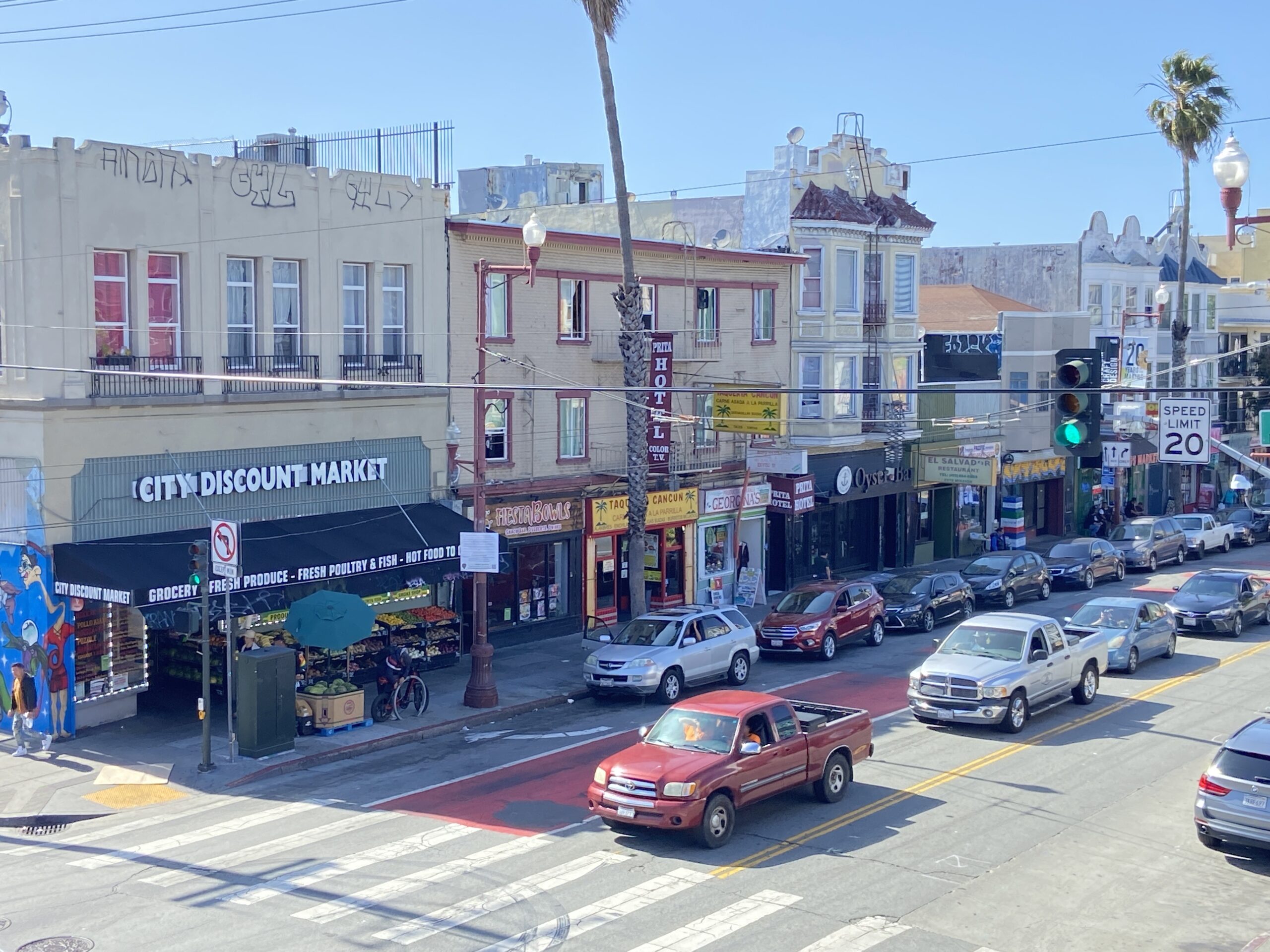2024 Case Studies: Community Ownership
SBAN has awarded grants to six organizations to conduct case studies of their community ownership efforts in six cities. Over the next year, these organizations will work with SBAN to document how they are supporting small businesses in gentrifying neighborhoods through community control of commercial assets, land, and enterprises.
Awardees will have the opportunity to learn from other case study teams, receive consultant support from SBAN experts, and share lessons with stakeholders in and beyond each awardee’s metro area. They will also present their work at the 2024 SBAN Summit and other SBAN events. SBAN will publish the case studies in 2025.
The Mission Economic Development Agency (San Francisco) and Partnership in Property Commercial Land Trust (Minneapolis) will also host site visits for SBAN members, staff, and leadership. These participatory workshops offer a first-hand look at how organizations are working with small businesses and residents on community ownership efforts.
Grant Awardees
Little Tokyo Community Impact Fund, Los Angeles, California
 Los Angeles’ Little Tokyo is under severe gentrification and displacement pressures, the latest threat in its 140-year history, which includes seizure of Japanese American property during WWII and previous waves of redevelopment. The Little Tokyo Community Impact Fund (LTCIF) was created to stem the displacement of legacy small businesses, a key element to cultural and community viability. The fund’s assets come from community investors who intentionally accept well-below-market returns, which enables LTCIF to acquire commercial real estate and lease spaces at stable, below-market rents to at-risk, community-serving legacy small businesses. The investment model – rather than a donations model – encourages a sense of community ownership in Little Tokyo.
Los Angeles’ Little Tokyo is under severe gentrification and displacement pressures, the latest threat in its 140-year history, which includes seizure of Japanese American property during WWII and previous waves of redevelopment. The Little Tokyo Community Impact Fund (LTCIF) was created to stem the displacement of legacy small businesses, a key element to cultural and community viability. The fund’s assets come from community investors who intentionally accept well-below-market returns, which enables LTCIF to acquire commercial real estate and lease spaces at stable, below-market rents to at-risk, community-serving legacy small businesses. The investment model – rather than a donations model – encourages a sense of community ownership in Little Tokyo.
This case study will examine LTCIF’s activities since its inception, including the decision-making process, actions and outcomes, how strategies have evolved with experience, and LTCIF’s experience as a one of the first California Social Purpose Corporations, which pursue a public purpose along with their fiduciary responsibilities to shareholders.
Mangrove Community Wealth, Brooklyn, New York
 Flatbush Central Caribbean Marketplace and its co-located incubator, Mangrove Flatbush Central (collectively, FC x Mangrove) preserves and grows businesses in Flatbush, Brooklyn, by providing affordable production and operating space, supportive infrastructure for entrepreneurship and community-led programming, and community wealth-building education.
Flatbush Central Caribbean Marketplace and its co-located incubator, Mangrove Flatbush Central (collectively, FC x Mangrove) preserves and grows businesses in Flatbush, Brooklyn, by providing affordable production and operating space, supportive infrastructure for entrepreneurship and community-led programming, and community wealth-building education.
This case study will explore the impact of Mangrove’s below-market food vending space paired with technical assistance, opportunities for businesses to scale from pop-up to a long-term agreement with equitable profit-sharing rent models, and the organization’s wealth-building education that lays groundwork for community asset ownership. The study will also examine Mangrove’s temporary business relocation strategy during building renovation.
The Miami Foundation, Miami, Florida
 The Miami Open for Business (OFB) Collective Real Estate Ownership (CREO) commercial down payment fund was born directly out of small business community feedback about the increasing unaffordability of property in Miami. With support from Wells Fargo, Open for Business launched in 2022 as a $20 million program to support minority small business owners to build assets, including real estate. As part of this program, The Miami Foundation introduced CREO, believed to be South Florida’s first ever commercial real estate down payment assistance product.
The Miami Open for Business (OFB) Collective Real Estate Ownership (CREO) commercial down payment fund was born directly out of small business community feedback about the increasing unaffordability of property in Miami. With support from Wells Fargo, Open for Business launched in 2022 as a $20 million program to support minority small business owners to build assets, including real estate. As part of this program, The Miami Foundation introduced CREO, believed to be South Florida’s first ever commercial real estate down payment assistance product.
Capitalized at $7.2MM, the fund has supported four small business collaboratives to purchase property to date, with eight additional collectives in the pipeline. The five-year forgivable loan covers up to 20% of the purchase price, not to exceed $500,000, towards the purchase of a small business-owner occupied commercial property in a shared ownership model. Applicants must form a collaborative so more than one business has property rights and equity.
This case study by the Miami Foundation and Behavioral Science Research Institute (BSRI) will analyze the implementation and impacts of CREO on Miami-Dade communities.
Mission Economic Development Agency, San Francisco-Oakland, California
 The Mission Economic Development Agency (MEDA) supports Latinx residents and small business owners in the Bay Area, one the fastest gentrifying metro areas in the country. MEDA’s three commercial anti-displacement strategies focus on producing new community-owned commercial spaces, preserving existing commercial spaces, and creating land use and real estate tools that support small businesses and community-based organizations. The goal is to safeguard the neighborhood’s rich Latino immigrant heritage and economic strength while addressing the ongoing challenges of small business stability within a gentrifying neighborhood.
The Mission Economic Development Agency (MEDA) supports Latinx residents and small business owners in the Bay Area, one the fastest gentrifying metro areas in the country. MEDA’s three commercial anti-displacement strategies focus on producing new community-owned commercial spaces, preserving existing commercial spaces, and creating land use and real estate tools that support small businesses and community-based organizations. The goal is to safeguard the neighborhood’s rich Latino immigrant heritage and economic strength while addressing the ongoing challenges of small business stability within a gentrifying neighborhood.
MEDA works with other community-based affordable housing developers and city agencies, financial lenders, and community organizations to establish affordable, long-term commercial spaces for nonprofits, small businesses, and cultural arts uses. Recent wins include construction of six new affordable housing buildings, which provide 10 new community-owned affordable ground-floor commercial spaces.
The case study will examine the impact of MEDA’s three commercial anti-displacement strategies.
Partnership in Property Commercial Land Trust, Minneapolis, Minnesota
 Partnership in Property Commercial Land Trust (PIPCLT) was established in North Minneapolis in 2018 to preserve affordable commercial property for BIPOC business owners. PIPCLT ensures perpetual affordability and ownership opportunities for historically marginalized communities by employing a community land trust model. Strategies include providing renewable ground leases and innovative ownership structures tailored to the needs of business owners.
Partnership in Property Commercial Land Trust (PIPCLT) was established in North Minneapolis in 2018 to preserve affordable commercial property for BIPOC business owners. PIPCLT ensures perpetual affordability and ownership opportunities for historically marginalized communities by employing a community land trust model. Strategies include providing renewable ground leases and innovative ownership structures tailored to the needs of business owners.
Beyond property acquisition, PIPCLT’s efforts include rehabilitation and development to stabilize BIPOC-owned businesses at risk of displacement. The organization also offers tenant support services and community engagement initiatives, all aimed at ensuring that individuals, families, and communities historically excluded from land ownership have the tools, resources, and opportunities to participate in the economic activity of their neighborhoods.
This case study will explore PIPCLT’s success advancing anti-displacement strategies in Minneapolis, a city marked by racial wealth gaps and economic disparities.
Women’s Opportunities Resource Center, Philadelphia, Pennsylvania
 Founded in 1993, the Women’s Opportunities Resource Center (WORC) integrates financial literacy and self-sufficiency programs – including self-employment training, business lending, and incentive saving – into an integrated asset-building approach to help low-income families of color reach financial self-sufficiency. As a Community Development Financial Institution (CDFI), WORC offers Commercial Real Estate (CRE) Loans, a program of the City of Philadelphia Department of Commerce.
Founded in 1993, the Women’s Opportunities Resource Center (WORC) integrates financial literacy and self-sufficiency programs – including self-employment training, business lending, and incentive saving – into an integrated asset-building approach to help low-income families of color reach financial self-sufficiency. As a Community Development Financial Institution (CDFI), WORC offers Commercial Real Estate (CRE) Loans, a program of the City of Philadelphia Department of Commerce.
CRE Loans, up to $350,000, enable low-income micro-entrepreneurs to purchase the space in which they are operating or will operate. The funds help clients to avoid displacement from gentrifying areas of greater Philadelphia and create an instant path for building assets and wealth. WORC also provides crucial support services, including individualized pre- and post-loan technical assistance and grants to defray up-front closing costs and downpayments that often keep real estate purchases out of reach.
This case study will examine the impact of WORC’s CRE Loan program on Philadelphia-area small business owners.
.
